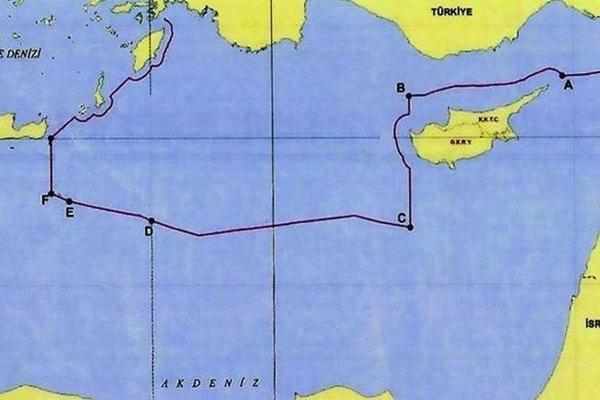Turkey proceeds for approval of Libya deal, yet not aims tension in E Med
Sevil Erkuş - ANKARA


Turkey keeps diplomatic channels open for maritime boundary delimitation with all coastal states with which it has diplomatic relations in the eastern Mediterranean, and the latest maritime boundary deal with Libya does not aim to raise tensions in the region, a Turkish diplomat told Hürriyet Daily News.
“Ankara protects both the rights of Turkey and the Turkish Cypriots in the eastern Mediterranean, but always keep ways of diplomacy open,” the diplomat said, only excluding Greek Cypriots as this would only be possible after the comprehensive settlement with the participation of the Turkish Cypriots.
A memorandum between Turkey and Libya on maritime boundaries in the eastern Mediterranean Sea will be sent to the Turkish Parliament in the upcoming days for approval following a briefing that foreign ministry officials made for the lawmakers on Dec.4
The memorandum of understanding will also be approved by Libya’s United Nations-recognized government cabinet, said the diplomat.
On Nov. 27, the foreign ministers of Libya and Turkey sealed the “Marine Jurisdictions” maritime boundary delimitation deal in Istanbul.
This is the second such agreement of Turkey for the eastern Mediterranean following its deal with Turkish Cypriots signed in 2011. Turkey has yet to proclaim any exclusive economic zone in the region, which may add a fisheries dimension to the existing oil and gas competition.
The deal establishes 18.6 nautical miles
The memorandum establishes 18.6 nautical miles of a continental shelf and Exclusive Economic Zone boundary line between Turkey and Libya.
This boundary line was disclosed by the Turkish Foreign Ministry on Dec. 2 through a Twitter message of a senior diplomat responsible for maritime issues Ambassador Çağatay Erciyes.
Ahead of signing a deal with Libya, Turkey on Nov.13 sent a letter to the U.N. addressing the secretary-general and reaffirmed the outer limits of its continental shelf in the eastern Mediterranean.
The coordinates agreed with Libya coincide with the legal position expressed in that letter and are fully compatible with international law, including the U.N. Convention on the Law of the Sea (UNCLOS), the diplomat noted.
Turkey argues that the islands which lie on the opposite side of the median line between two mainlands cannot create maritime jurisdiction areas. Turkey also highlights the importance of comparative coastal lengths and the principle of equitable delimitation. Accordingly, it argues that the Greek islands and the western front of Cyprus should not be given any maritime jurisdiction other than territorial waters.
Turkey has been in talks with Libyan authorities for a maritime boundaries agreement since 2009, even in the period of Muammar Gaddafi’s rule, the diplomat noted, stressing that this strategy has not come upon most recent developments in the eastern Mediterranean.
Libya, an oil-rich country, has remained beset by turmoil since 2011 when Gaddafi was ousted and killed in a NATO-backed uprising after four decades in power.
Greek PM wanted to meet Erdoğan
The agreement with Libya does not completely resolve disputes concerning maritime jurisdiction areas in the eastern Mediterranean, but Ankara sees the deal as an important advantage to support its legal and political arguments.
President Recep Tayyip Erdoğan and Greek Prime Minister Kyriakos Mitsotakis were scheduled to meet on the sidelines of a NATO meeting in London on Dec. 4, after Daily News went press, upon demand by Greek side following Turkey’s move with Libya.
Libya hails deal with Turkey on maritime boundaries
Meanwhile, the memorandum is important to secure Libya’s natural resources, the country’s High Council of State said Dec. 3. Libya’s U.N.-recognized government has a right to sign memoranda with any country to ensure the country’s security and the protection of its resources, the council said in a statement. Regarding condemnations by Egypt, Greece and the Greek Cypriots, the council said it gives great importance to enhancing relations with these countries.
